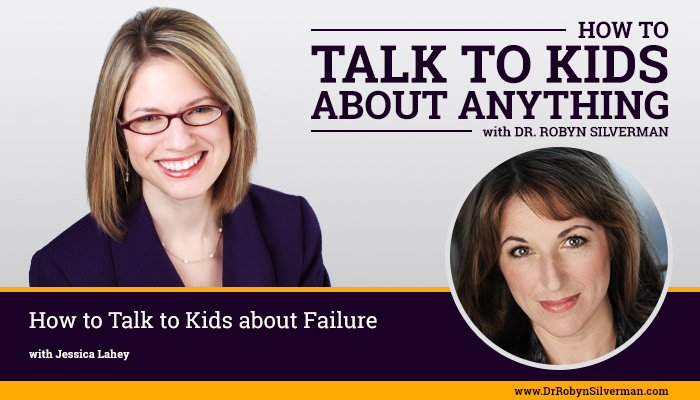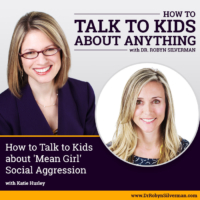Podcast: Play in new window | Download
Subscribe: Apple Podcasts | RSS | More
How to talk to Kids About the Gift of Failure
This podcast will focus on the importance of allowing children to fail. Discover why, during the school-age and teen years, it is vital for parents and educators to allow young people to experience the disappointment, frustration and struggle that occurs when they are challenged by life’s problems. Find out how failure and learning to bounce back and ultimately succeed, put children on the path to growing up and becoming successful, resilient and self-reliant adults.
Special Guest: Jessica Lahey
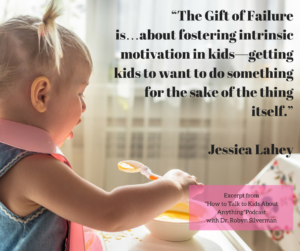 This podcast provides:
This podcast provides:
- Tips: Specific tips on what to do to help our children become more self sufficient, more resilient and more responsible for themselves.
- Scripts: What to say (and how to show and model) to our kids about failing, making mistakes and dealing with the consequences of those mistakes
- Steps: Steps to shift the household culture from one where the parent does everything to everyone pulls their weight
- Barriers to success: What has been getting in our way, as parents, of allowing our kids to cope and learn from mistakes?
Important Messages:
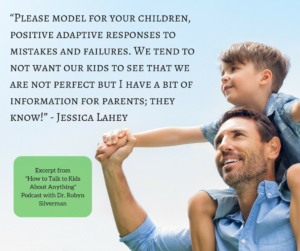
- Intrinsic motivation comes down to 3 things: Fostering kids’ autonomy, helping kids feel competent (confidence based on experience) and connection with us as the key adults in their lives.
- Are you able to check off the box at night that says; “I was a good parent today?” This is not about what you did to make you feel good but what was actually helpful to your kid in the long run. (Listen to the story about her son leaving his homework at home by mistake!)
- Ask yourself; what will you want your kids to be able to do in a year?
- Talk out YOUR mistakes and how we deal with them. Ask your kids for strategies.
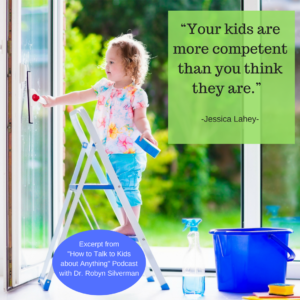 Model, think long term and realize that if we’ve been good parents, the kids aren’t going to need us anymore—they will feel more competent in the long term.
Model, think long term and realize that if we’ve been good parents, the kids aren’t going to need us anymore—they will feel more competent in the long term.- Stop parenting for emergencies!
- Allow your children to have some control. Kids who don’t feel like they have control, they tend to lie more.
- Start talking about the process rather than the product.
Notable Quotables:
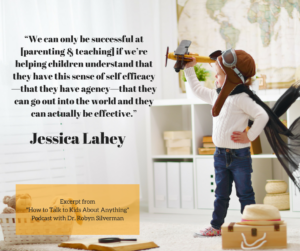
- “We can only be successful at [parenting & teaching] if we’re helping children understand that they have this sense of self efficacy—that they have agency—that they can go out into the world and they can actually be effective.” ~ Jessica Lahey
- “I give constructive feedback when constructive feedback is needed but kids need to know that they are worth something—especially kids who don’t hear that very often.” ~ Jessica Lahey
- “Really the Gift of Failure is…about fostering intrinsic motivation in kids—getting kids to want to do something for the sake of the thing itself.” ~ Jessica Lahey
- “We don’t get progress reports on our parenting. Lacking that, we tend to look at our kids. We tend to say; if my kid is getting all A’s and my kid is on the traveling soccer league, then I must be doing great as a parent. Not only is that unfair to kids, it’s false. Our kids are not a reflection of us, they are their own people.” ~ Jessica Lahey
- “Please model for your children, positive adaptive responses to mistakes and failures. We tend to not want our kids
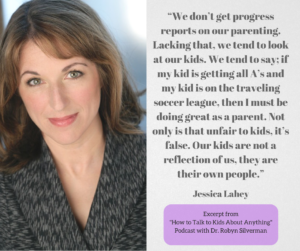 to see that we are not perfect but I have a bit of information for parents; they know!” ~ Jessica Lahey
to see that we are not perfect but I have a bit of information for parents; they know!” ~ Jessica Lahey - “Your kids are more competent than you think they are.” ~ Jessica Lahey
- “We tend to pay lip service. ‘You know sweetie, what I really care about is that you’re learning.’ But then we put the report card on the refrigerator and we check into the parent portal and we ask them how the French test went as soon as they get in the door.” ~ Jessica Lahey
- “We feel like that grade is evidence not only of our children being wonderful but of our parenting. And I think we just need to get a grip and realize that our children’s grades have almost nothing with us as human beings.” ~ Jessica Lahey

